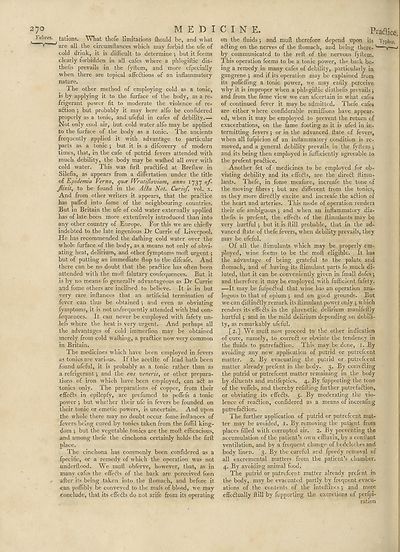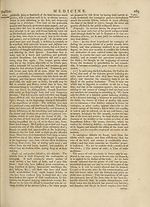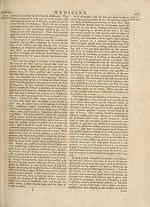Encyclopaedia Britannica, or, a Dictionary of arts, sciences, and miscellaneous literature : enlarged and improved. Illustrated with nearly six hundred engravings > Volume 13, MAT-MIC
(312) Page 270
Download files
Complete book:
Individual page:
Thumbnail gallery: Grid view | List view

M E D I
tations. What thefe limitations lliould be, and what
are all the circumftances which may forbid the ufe of
cold drmk, it is difficult to determine ; but it feems
clearly forbidden in all cafes where a phlogiftic dia-
thehs prevails in the fyitem, and more efpecially
when there are topical affections of an inflammatory
nature.
The other method of employing cold as a tonic,
is by applying it to the furface of the body, as a re¬
frigerant power fit to moderate the violence of re-
adtion ; but probably it may here alfo be confidered
properly as a tonic, and ufeful in cafes of debility.—
Not only cool air, but cold water alfo may be applied
to the furface of the body as a tonic. The ancients
frequently applied it with advantage to particular
parts as a tonic ; but it is a difcovery of modern
times, that, in the cafe of putrid fevers attended with
much debility, the body may be wafhed all over with
cold water. This was firft pradtifed at Breflaw in
Silefia, as appears from a differtation under the title
of Epidemia Verna, quae Wratiflaviam, anno 1737 af-
jlixit, to be found in the ABa Nat. Curiof. vol. x.
And from other writers it appears, that the pradtice
has paffed into fome of the neighbouring countries.
But in Britain the ufe of cold water externally applied
has of late been more extenfively introduced than into
any other country of Europe. For this we are chiefly
indebted to the late ingenious Dr Currie of Liverpool.
He has recommended the dafhing cold water over the
wffiole furface of the body, as a means not only of obvi¬
ating heat, delirium, and other fymptoms moft urgent •,
but of putting an immediate flop to the difeafe. And
there can be no doubt that the pradtice has often been
attended with the moft falutary confequences. But it
is by no means fo generally advantageous as Dr C urrie
and fome others are inclined to believe. It is in but
very rare inftances that an artificial termination of
fever can thus be obtained ; and even as obviating
fymptoms, it is not unfrequently attended with bad con¬
fequences. It can never be employed with fafety un-
lefs where the heat is very urgent. And perhaps all
the advantages of cold immerfion may be obtained
merely from cold wafhing, a pradtice norv very common
in Britain.
The medicines which have been employed in fevers
as tonics are various. If the acetite of lead hath been
found ufeful, it is probably as a tonic rather than as
a refrigerant ; and the ens veneris, or other prepara¬
tions of iron which have been employed, can adt as
tonics only. The preparations of copper, from their
effedts in epilepfy, are prefumed to poffefs a tonic
power •, but whether their ufe in fevers be founded on
their tonic or emetic powrers, is uncertain. And upon
the whole there may no doubt occur fome inftances of
fevers being cured by tonics taken from the foffil king¬
dom •, but the vegetable tonics are the moft efficacious,
and among thefe the cinchona certainly holds the firft
place.
The cinchona has commonly been eonfidered as a
fpecific, or a remedy of which the operation wras not
underftood. We muft obferve, however, that, as in
many cafes the effedls of the bark are perceived foon
after its being taken into the ftomach, and before it
can poffibly be conveyed to the mals of blood, we may
conclude, that its effedts do not arife from its operating
CINE.
Pradice.
on the fluids \ and muft therefore depend upon its Typhus,
adting on the nerves of the ftomach, and being there-v—~v-~-
by communicated to the reft of the nervous fyftem.
This operation feems to be a tonic power, the bark be¬
ing a remedy in many cafes of debility, particularly in
gangrene j and if its operation may be explained from
its poffefling a tonic power, we may eaiily perceive
why it is improper when a phlogiftic diathefis prevails;
and from the fame view we can afcertain in what cafes
of continued fever it may be admitted. Thefe cafes
are either where confiderable remiffions have appear¬
ed, when it may be employed to prevent the return of
exacerbations, on the fame footing as it is ufed in in¬
termitting fevers } or in the advanced ftate of fevers,
when all fufpicion of an inflammatory condition is re¬
moved, and a general debility prevails in the fyftem
and its being then employed is fufficiently agreeable to
the prefent pradlice.
Another fet of - medicines to be employed for ob¬
viating debility and its effedts, are the diredt ftimu-
lants. Thefe, in fome meafure, increafe the tone of
the moving fibres •, but are different from the tonics,
as they more diredtly excite and increafe the adtion of
the heart and arteries. This mode of operation renders
their ufe ambiguous j and when an inflammatory dia¬
thefis is prefent, the effedts of the ftimulants may be
very hurtful 5 but it is ftill probable, that in the ad¬
vanced ftate of thefe fevers, when debility prevails, they
may be ufeful.
Of all the ftimulants which may be properly em¬
ployed, wine feems to be the moft; eligible. It has
the advantage of being grateful to the palate and
ftomach, and of having its ftimulant parts fo much di¬
luted, that it can be conveniently given in fmall dofes •,
and therefore it may be employed with fufficient fafety.
—It may be fufpedted that wine has an operation ana¬
logous to that of opium ; and on good grounds. But
we can diftindtly remark its ftimulant power only ; which
renders its effedls in the phrenetic delirium manifeftly
hurtful ; and in the mild delirium depending on debili¬
ty, as remarkably ufeful.
[2.] We muft now proceed to the other indication
of cure, namely, to corredt or obviate the tendency in
the fluids to putrefadlion. This may be done, I. By
avoiding any new application of putrid or putrefeent
matter. 2. By evacuating the putrid or. putrefeent
matter already prefent in the body. 3. By corredling
the putrid or putrefeent matter remaining in the body
by diluents and antifeptics. 4. By fupporting the tone
of the veffels, and thereby refilling further putrefadlion,
or obviating its effedls. 5. By moderating the vio¬
lence of readtion, confidered as a means of increafing
putrefadlion.
The further application of putrid or putrefeent mat¬
ter may be avoided, 1. By removing the patient from
places filled with corrupted air. 2. By preventing the
accumulation of the patient’s own effluvia, by a conflant
ventilation, and by a frequent change of bedclothes and
bodv linen. 3. By the careful and fpeedy removal of
all excremental matters from the patient’s chamber.
4. By avoiding animal food.
The putrid or putrefeent matter already prefent in
the bodv, may be evacuated partly by frequent evacu¬
ations of the contents of the inteftines j and more
effedlually ftill by fupporting the excretions of perfpi-
ration
tations. What thefe limitations lliould be, and what
are all the circumftances which may forbid the ufe of
cold drmk, it is difficult to determine ; but it feems
clearly forbidden in all cafes where a phlogiftic dia-
thehs prevails in the fyitem, and more efpecially
when there are topical affections of an inflammatory
nature.
The other method of employing cold as a tonic,
is by applying it to the furface of the body, as a re¬
frigerant power fit to moderate the violence of re-
adtion ; but probably it may here alfo be confidered
properly as a tonic, and ufeful in cafes of debility.—
Not only cool air, but cold water alfo may be applied
to the furface of the body as a tonic. The ancients
frequently applied it with advantage to particular
parts as a tonic ; but it is a difcovery of modern
times, that, in the cafe of putrid fevers attended with
much debility, the body may be wafhed all over with
cold water. This was firft pradtifed at Breflaw in
Silefia, as appears from a differtation under the title
of Epidemia Verna, quae Wratiflaviam, anno 1737 af-
jlixit, to be found in the ABa Nat. Curiof. vol. x.
And from other writers it appears, that the pradtice
has paffed into fome of the neighbouring countries.
But in Britain the ufe of cold water externally applied
has of late been more extenfively introduced than into
any other country of Europe. For this we are chiefly
indebted to the late ingenious Dr Currie of Liverpool.
He has recommended the dafhing cold water over the
wffiole furface of the body, as a means not only of obvi¬
ating heat, delirium, and other fymptoms moft urgent •,
but of putting an immediate flop to the difeafe. And
there can be no doubt that the pradtice has often been
attended with the moft falutary confequences. But it
is by no means fo generally advantageous as Dr C urrie
and fome others are inclined to believe. It is in but
very rare inftances that an artificial termination of
fever can thus be obtained ; and even as obviating
fymptoms, it is not unfrequently attended with bad con¬
fequences. It can never be employed with fafety un-
lefs where the heat is very urgent. And perhaps all
the advantages of cold immerfion may be obtained
merely from cold wafhing, a pradtice norv very common
in Britain.
The medicines which have been employed in fevers
as tonics are various. If the acetite of lead hath been
found ufeful, it is probably as a tonic rather than as
a refrigerant ; and the ens veneris, or other prepara¬
tions of iron which have been employed, can adt as
tonics only. The preparations of copper, from their
effedts in epilepfy, are prefumed to poffefs a tonic
power •, but whether their ufe in fevers be founded on
their tonic or emetic powrers, is uncertain. And upon
the whole there may no doubt occur fome inftances of
fevers being cured by tonics taken from the foffil king¬
dom •, but the vegetable tonics are the moft efficacious,
and among thefe the cinchona certainly holds the firft
place.
The cinchona has commonly been eonfidered as a
fpecific, or a remedy of which the operation wras not
underftood. We muft obferve, however, that, as in
many cafes the effedls of the bark are perceived foon
after its being taken into the ftomach, and before it
can poffibly be conveyed to the mals of blood, we may
conclude, that its effedts do not arife from its operating
CINE.
Pradice.
on the fluids \ and muft therefore depend upon its Typhus,
adting on the nerves of the ftomach, and being there-v—~v-~-
by communicated to the reft of the nervous fyftem.
This operation feems to be a tonic power, the bark be¬
ing a remedy in many cafes of debility, particularly in
gangrene j and if its operation may be explained from
its poffefling a tonic power, we may eaiily perceive
why it is improper when a phlogiftic diathefis prevails;
and from the fame view we can afcertain in what cafes
of continued fever it may be admitted. Thefe cafes
are either where confiderable remiffions have appear¬
ed, when it may be employed to prevent the return of
exacerbations, on the fame footing as it is ufed in in¬
termitting fevers } or in the advanced ftate of fevers,
when all fufpicion of an inflammatory condition is re¬
moved, and a general debility prevails in the fyftem
and its being then employed is fufficiently agreeable to
the prefent pradlice.
Another fet of - medicines to be employed for ob¬
viating debility and its effedts, are the diredt ftimu-
lants. Thefe, in fome meafure, increafe the tone of
the moving fibres •, but are different from the tonics,
as they more diredtly excite and increafe the adtion of
the heart and arteries. This mode of operation renders
their ufe ambiguous j and when an inflammatory dia¬
thefis is prefent, the effedts of the ftimulants may be
very hurtful 5 but it is ftill probable, that in the ad¬
vanced ftate of thefe fevers, when debility prevails, they
may be ufeful.
Of all the ftimulants which may be properly em¬
ployed, wine feems to be the moft; eligible. It has
the advantage of being grateful to the palate and
ftomach, and of having its ftimulant parts fo much di¬
luted, that it can be conveniently given in fmall dofes •,
and therefore it may be employed with fufficient fafety.
—It may be fufpedted that wine has an operation ana¬
logous to that of opium ; and on good grounds. But
we can diftindtly remark its ftimulant power only ; which
renders its effedls in the phrenetic delirium manifeftly
hurtful ; and in the mild delirium depending on debili¬
ty, as remarkably ufeful.
[2.] We muft now proceed to the other indication
of cure, namely, to corredt or obviate the tendency in
the fluids to putrefadlion. This may be done, I. By
avoiding any new application of putrid or putrefeent
matter. 2. By evacuating the putrid or. putrefeent
matter already prefent in the body. 3. By corredling
the putrid or putrefeent matter remaining in the body
by diluents and antifeptics. 4. By fupporting the tone
of the veffels, and thereby refilling further putrefadlion,
or obviating its effedls. 5. By moderating the vio¬
lence of readtion, confidered as a means of increafing
putrefadlion.
The further application of putrid or putrefeent mat¬
ter may be avoided, 1. By removing the patient from
places filled with corrupted air. 2. By preventing the
accumulation of the patient’s own effluvia, by a conflant
ventilation, and by a frequent change of bedclothes and
bodv linen. 3. By the careful and fpeedy removal of
all excremental matters from the patient’s chamber.
4. By avoiding animal food.
The putrid or putrefeent matter already prefent in
the bodv, may be evacuated partly by frequent evacu¬
ations of the contents of the inteftines j and more
effedlually ftill by fupporting the excretions of perfpi-
ration
Set display mode to:
![]() Universal Viewer |
Universal Viewer | ![]() Mirador |
Large image | Transcription
Mirador |
Large image | Transcription
Images and transcriptions on this page, including medium image downloads, may be used under the Creative Commons Attribution 4.0 International Licence unless otherwise stated. ![]()
| Permanent URL | https://digital.nls.uk/192665218 |
|---|
| Attribution and copyright: |
|
|---|
| Description | Ten editions of 'Encyclopaedia Britannica', issued from 1768-1903, in 231 volumes. Originally issued in 100 weekly parts (3 volumes) between 1768 and 1771 by publishers: Colin Macfarquhar and Andrew Bell (Edinburgh); editor: William Smellie: engraver: Andrew Bell. Expanded editions in the 19th century featured more volumes and contributions from leading experts in their fields. Managed and published in Edinburgh up to the 9th edition (25 volumes, from 1875-1889); the 10th edition (1902-1903) re-issued the 9th edition, with 11 supplementary volumes. |
|---|---|
| Additional NLS resources: |
|

